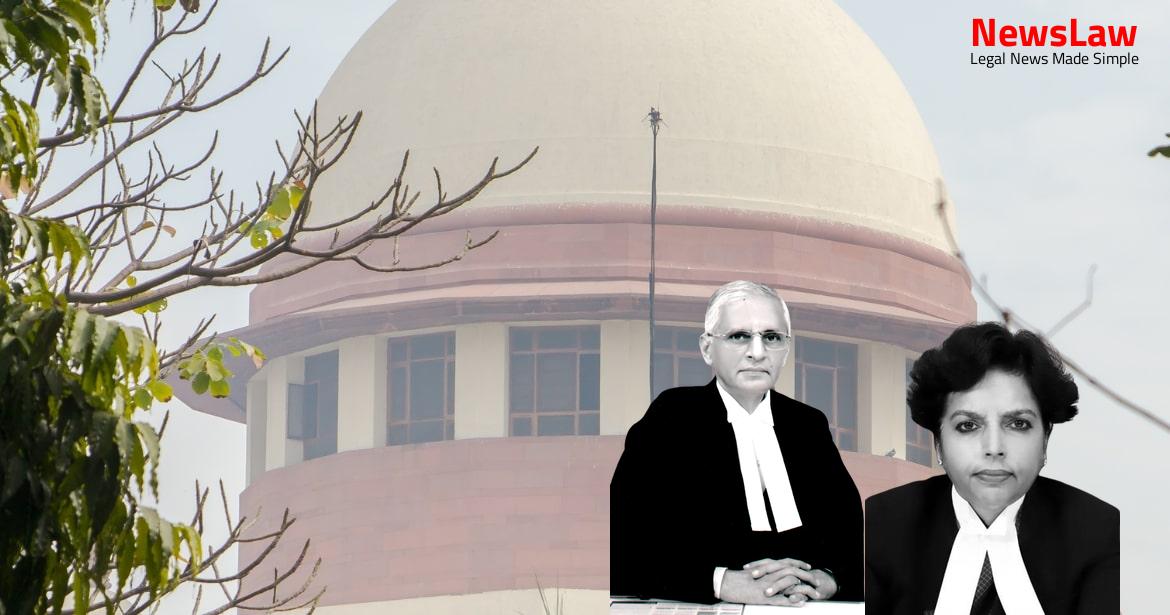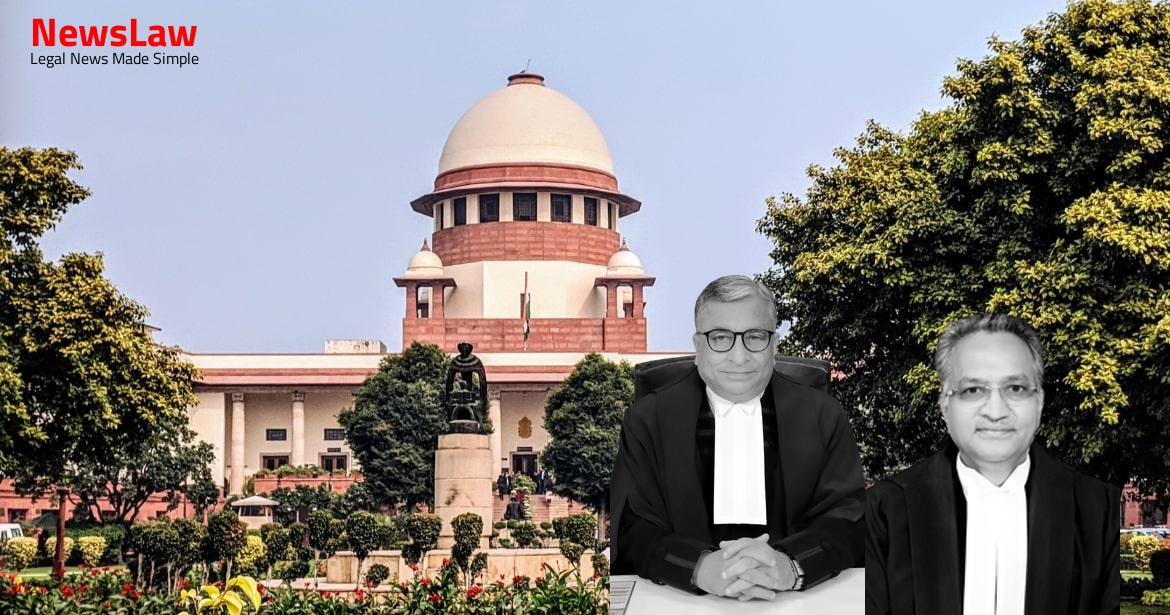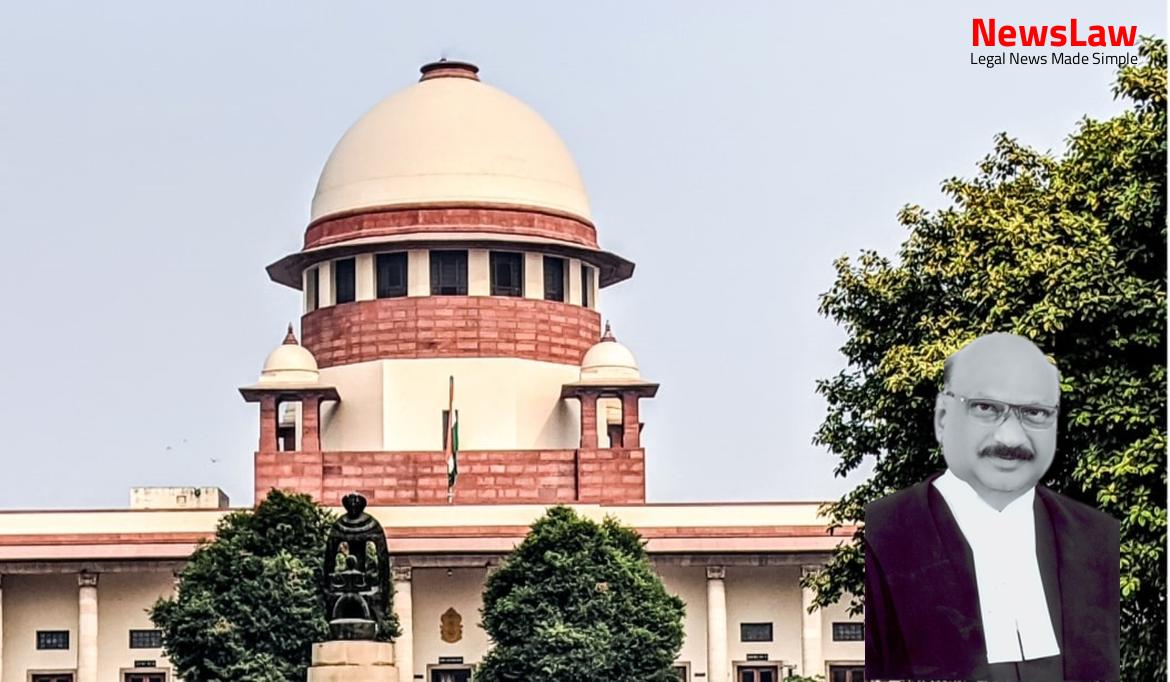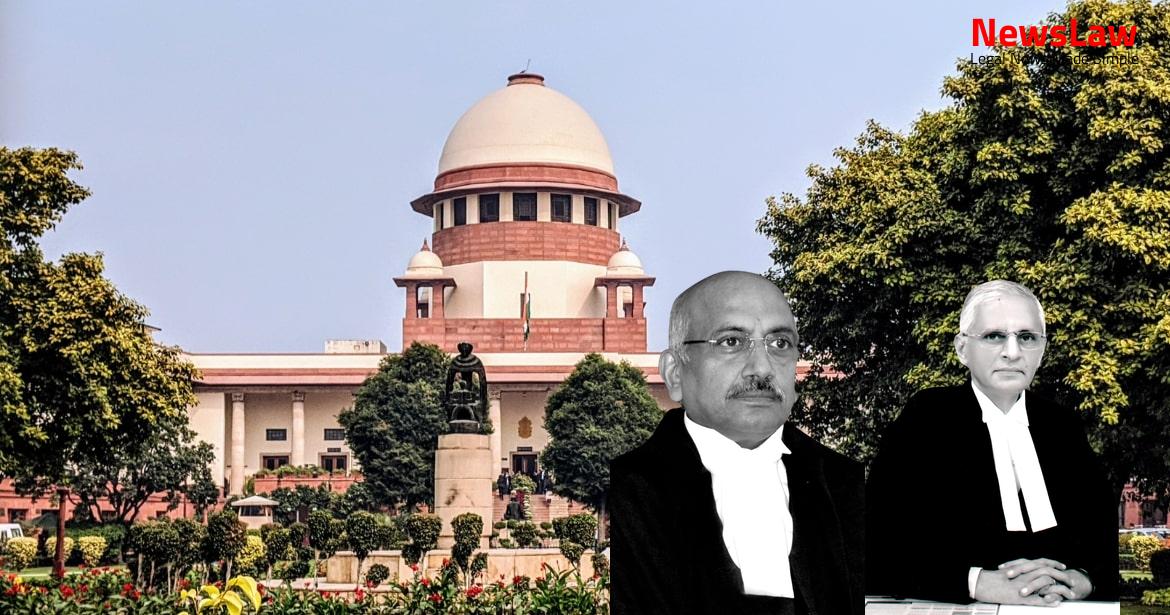Delve into the intricate legal analysis conducted by the court regarding the compliance with Section 142 of the N.I. Act in a recent case. The case delves into the requirements for filing a complaint under Section 138 and the significance of the representative’s authorization and knowledge. Understanding the implications of the court’s decision on the initiation and conduct of complaints under the Negotiable Instruments Act. Stay tuned for detailed insights into the legal intricacies of this case.
Facts
- The appellant filed a complaint under Section 138 and 142 of the Negotiable Instruments Act, 1881.
- The learned SDJM took cognizance of the complaint and directed summons to the respondent-accused.
- The cheques issued by the respondent were dishonored by the bank with the endorsement ‘account closed’.
- The complaint was registered based on an affidavit filed on behalf of the complainant.
- Notices sent to the respondent were received but not complied with, leading to the appellant issuing further notices.
- The respondent filed a petition under Section 482 of the Cr.P.C. claiming to be aggrieved by the order dated 05.11.2015.
- The respondent had issued seven cheques in favor of the appellant company, which were dishonored.
- The appellant is challenging the judgment passed by the High Court in CRLMC No.1210 of 2017.
- The High Court disposed of the petition and quashed the order dated 05.11.2015 passed by the learned SDJM, Jharsuguda.
- The order in question pertained to the taking of cognizance and issuance of summons in I.C.C. Case No. 422 of 2015.
Also Read: Supreme Court Upholds Rejection of Plaint Under Order VII Rule 11 of CPC: A Critical Analysis
Arguments
- The appellant’s counsel argued that the High Court misinterpreted the principles laid down in A.C. Narayanan case resulting in the appellant’s non-suit.
- The learned SDJM, while taking cognizance, examined the complaint and the entire record before issuing summons.
- Mr. Subhasis Kumar Das, General Manager (Accounting) representing the company in the complaint, was a witness to the agreement in question.
- The respondent contested that the order of cognizance and the summons issued should be quashed.
- The High Court, citing A.C. Narayanan case, found faults in the lack of specifics regarding the authorization of the General Manager (Accounting) in the complaint.
- Mr. Subhasis Kumar Das was not only a senior managerial officer but was also authorized by the Managing Director to initiate legal proceedings.
- The complaint was filed in compliance with the law, starting from the Board’s approval, and the High Court’s decision to quash the cognizance was criticized as lacking proper analysis.
- The agreement dated 18.07.2014 between the appellant and respondent holds significance in the case.
- The High Court concluded that the complaint filed did not satisfy the requirement of Section 142 of the N.I. Act as it was not filed by a person authorized by the company.
- The High Court’s decision was based on a judgment of the Supreme Court and Orissa High Court.
- The appellant’s complaint under Section 138 of the N.I. Act is being questioned for compliance with Section 142 of the N.I. Act.
- The issue under consideration is whether the complaint meets the requirements of Section 142 of the N.I. Act.
- The High Court’s decision was heavily influenced by the Supreme Court’s decision in A.C. Narayanan.
Also Read: Validity of Debt and Enforcement of Section 138 NI Act
Analysis
- Courts can only take cognizance of offences punishable under section 138 upon a written complaint made by the payee or the holder of the cheque.
- This provision overrides the Code of Criminal Procedure, 1973.
- The complaint must be in writing to initiate legal proceedings for offences under section 138.
- Section 142 of the NI Act mandates the complaint to be made by the payee or the holder in due course.
- The complaint should be in the name of the payee if the payee is a company.
- The power-of-attorney holder can depose and verify on oath before the court to prove the contents of the complaint.
- The authorization and knowledge of the person filing the complaint must be explicitly averred in the complaint.
- If the complainant is a company, an authorized employee can represent the company.
- The de facto complainant, when the complainant is a company, will be an authorized employee.
- The legal procedure for initiating, conducting, and disposing of complaints under Section 138 of the NI Act is governed by the Code of Criminal Procedure.
- The Magistrate is not mandatorily required to examine the complainant upon oath before issuing process for the offence under Section 138 of the NI Act.
- The power-of-attorney holder must have witnessed the transaction or possess knowledge about the transaction to depose as a witness.
- The requirement of knowledge by the power-of-attorney holder must be explicitly stated in the complaint.
- Documents supporting the complaint can demonstrate delegation of power and knowledge of the transaction by the person representing the company, satisfying the requirements for filing the complaint.
- The High Court’s interference in the absence of averment about the representative’s knowledge or witness to the transaction was not upheld, as the facts satisfied the necessary requirements.
- It is open to the Magistrate to rely on affidavit verification filed by the complainant in support of the complaint under Section 138 of the NI Act.
- The complainant can be represented by an employee or a non-employee through authorization or resolution.
- The company becomes the de jure complainant, and its representative becomes the de facto complainant in criminal proceedings.
- In the case of M/s. M.M.T.C. Ltd. vs. Medchi Chemicals and Pharma (P} Ltd., (2002) 1 SCC 234, the scope of Section 142 (1)(a) of N.I. Act was considered.
- The decision in Vishwa Mitter vs O.P. Poddar, (1983) 4 SCC 701 was noted, stating that anyone can initiate criminal proceedings by filing a complaint before a Magistrate.
- National Small Industries Corporation Ltd. Vs. State (NCT of Delhi) and Ors. (2009) 1 SCC 407 extensively discussed the validity of a complaint under Section 138 of N.I. Act and the satisfaction of the requirements under Section 142.
- Samrat Shipping Co. Pvt. Ltd. Vs. Dolly George (2002) 9 SCC 455 disapproved the refusal of cognizance by the Magistrate.
- It was held that a company can only file a complaint through a human representative authorized by the company.
- Vishwa Mitter (supra) stated that if a special statute prescribes offences and provisions for taking cognizance, the complaint must meet the eligibility criteria of the statute.
- Janaki Vashdeo Bhojwani & Anr. vs Indusind Bank Ltd. & Ors. (2005) 2 SCC 217 discussed the right of a power of attorney holder to act on behalf of the principal in civil proceedings.
- Dismissal of a complaint at the threshold by the Magistrate on the question of authorization is not justified.
- Entertaining a petition under Section 482 to quash the order taking cognizance by the Magistrate is unjustified when the issue of proper authorization and knowledge can only be an issue for trial.
- The High Court was not justified in entertaining the petition filed under Section 482 of Cr.PC and quashing the order taking cognizance of the complaint.
Also Read: Enlargement on Bail in Illegal Mining Case
Decision
- Judgment in CRL. MC. No 1210 of 2017 by the High Court of Orissa, Cuttack is set aside.
- Complaint in I.C.C Case No 422 of 2015 is restored to the file of SDJM, Jharsuguda and listed on 15.03.2022 for appearance of parties.
- Respondent must appear on the said date before the learned Magistrate without expecting fresh summons.
- The complaint must be proceeded expeditiously and concluded within six months from the first date indicated.
- Appeal allowed with a cost of Rs. 1,00,000/- payable by the respondent to the appellant.
Case Title: M/S TRL KROSAKI REFRACTORIES LTD. Vs. M/S SMS ASIA PRIVATE LIMITED (2022 INSC 214)
Case Number: Crl.A. No.-000270-000270 / 2022



